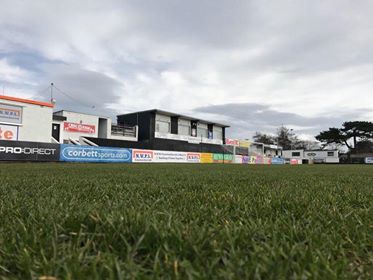What does Rhyl’s looming liquidation mean for the rest of Welsh football?

Belle Vue - the home of Rhyl FC (Image: Rhyl FC)
Welsh football faced a reality check as one of its most illustrious clubs announced its decision to begin the process of liquidation.
Rhyl – a side with 20 seasons of top-flight experience and two Cymru Premier titles – announced on Tuesday evening that the very existence of the club was coming to an end
So what next for Welsh football as it looks set to lose one of their biggest teams? Here are the points which will become prominent talking points following the aftermath of Rhyl’s intentions.
The state of the Cymru North
Before the FAW suspended domestic football in Wales due to the Coronavirus outbreak, Rhyl had seven games remaining.
Due to the inclusion of Colwyn Bay to the Cymru North, the division was operating at 17 team with four teams set for relegation.
With Rhyl now liquidating, the division will be reduced to 16, the usual number of teams during its former guise of the Cymru Alliance.
This saw three teams relegated from the division and three teams promoted. With Rhyl’s liquidation prompting withdrawal from the league, it seems one club could have a reprieve should football resume.
It would also see all of Rhyl’s results from this season expunged which could create a different looking table.
Where now for European football?
A number of Cymru Premier clubs have used Rhyl’s Belle Vue as their home for Europa League games.
Most recently, it staged Connah’s Quay’s matches with Kilmarnock and Partizan Belgrade, which attracted healthy crowds.
With the Nomads, Bala and Caernarfon all competing for a European spot, they may be required to use a new ground for their European games.
In recent years, the Racecourse Ground has been used by The New Saints. TNS’ own home Park Hall is also eligible to host European games to a certain round.
An alternative option is that Welsh clubs may now have to deal directly with the ground owner about playing at Belle Vue.
A new club?
In the club’s official statement, club chairman Paul Higginson was ‘hopeful’ of a phoenix side being formed following the decision to liquidate.
A difficult task for those who govern football in Wales would be where they would be placed.
When Barry and Llanelli had to reform, the initial decision was to begin at the bottom of the pyramid.
However following a battle in court, both Barry Town United and Llanelli Town began in the fourth tier of Welsh football.
Another new club Bangor 1876, a newly established club set up by former fans of Bangor City, were placed in the Gwynedd League – the fifth tier of Welsh football – and looked set for promotion having won all their games.






